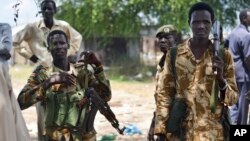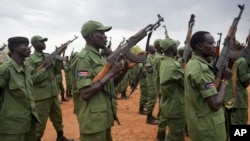Better late than never, that's what analysts say about an arms embargo on South Sudan.
The United States says it will back an arms embargo if the country's government blocks the deployment of a regional protection force in the war-torn country and continues to hinder the movement of U.N. staffers and peacekeepers.
But how much impact can the threat really have? A former arms expert on the U.N. Panel of Experts on South Sudan, Luuk van de Vondervoort, told VOA the United States has used the threat of an arms embargo as leverage several times, including once to get the government to sign a peace deal with rebels last year.
“Both sides have committed the most egregious violations of human rights law and there have been atrocities committed on a scale that we’ve not seen in many other contexts where an arms embargo has in fact been imposed,” said van de Vondervoort. “It’s normally the thing that you start with, not the end state.”
He said the delay may have given the government time to prepare.
“If you as a government are afraid that you won’t be allowed to import bullets anymore, what are you going to do? You make sure you can produce them yourself,” said van de Vondervoort.
He was referring to a Reuters report from earlier this month. According to the report, U.N. sanctions monitors have learned that South Sudan's army chief asked a Lebanese company to begin developing a small arms ammunition manufacturing facility in Juba.
The report did not say whether the project had proceeded.
Too little, too late?
To this point, South Sudan has been free to engage in state-to-state transfers in arms, without restrictions from sellers.
Rights groups have been calling for an arms embargo on South Sudan for more than two years.
Human Rights Watch senior researcher Jehanne Henry says it is long overdue.
“The weapons that enter South Sudan are inevitably used against civilians in this conflict, in this conflict that is especially abusive, that is especially conducted against civilians,” said Henry. “This is not a classic conflict between classic armies.”
South Sudan’s conflict has killed tens of thousands since it started in December 2013 and displaced more than two million. Aid agencies warn hundreds of thousands of people are on the brink of starvation.
Britain and France have supported imposing an arms embargo, while in the past other members of the U.N. Security Council have not. Russia says it is still too soon.
Since July, government troops have been accused of fresh attacks on civilians, international aid workers and U.S. diplomats.
U.S. Congressman Thomas Rooney addressed U.S. Special Envoy to Sudan and South Sudan Ambassador Donald Booth during a congressional hearing on September 8. He argued in favor of an arms embargo.
“What can it hurt if the United States does take the lead to say that enough is enough? We’ve got diplomatic envoys being shot at. We’ve got all kinds of crimes that we’ve talked about against its own citizenry. We’ve got humanitarian aid and food being seized upon. We’ve got the opposition has fled. We’ve got a government that has lost control of its own military,” said Rooney.
Questions about effectiveness
Some experts say arms embargoes in general don't work. They say there just isn't enough oversight of the global weapons trade to enforce them.
Zach Vertin, a fellow at the Washington-based Woodrow Wilson Center, argues that although an arms embargo is important, it’s not the solution to South Sudan’s problems.
“An arms embargo is long overdue, as it can have some impact in curtailing senseless government violence and access to sophisticated weapons in the short term,” said Vertin. “But we should also be careful not to attach outsized expectations to it; the path to a sustainable peace can only come through fundamental political changes.”
Chatham House Horn of Africa research associate Ahmed Soliman agreed that there is no substitute for a political solution.
“If they’ve not acted in the spirit of the agreement since its signing, it doesn’t seem as if it’s going to change and I would posit that an arms embargo is probably unlikely to change that,” said Soliman. “You know, coupled with travel embargoes and other things, there is a symbolic nature to these sanctions, but not necessarily they’re not going to alter the realities on the ground too much and too quickly, I don’t think.”
Several calls to South Sudan’s presidential spokesman for comment went unanswered.






